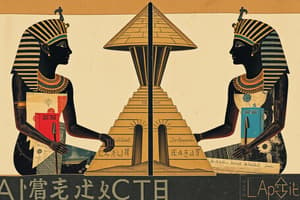Podcast
Questions and Answers
What was the basis for the social classes in Ancient Egypt?
What was the basis for the social classes in Ancient Egypt?
Who were considered the 'intellectuals' in Ancient Egypt?
Who were considered the 'intellectuals' in Ancient Egypt?
What was the primary role of soldiers in Ancient Egypt?
What was the primary role of soldiers in Ancient Egypt?
Which social class in Ancient Egypt was responsible for keeping records and managing towns?
Which social class in Ancient Egypt was responsible for keeping records and managing towns?
Signup and view all the answers
What made religion massively important to the Egyptians?
What made religion massively important to the Egyptians?
Signup and view all the answers
Which group in Ancient Egypt had very few rights, or none at all?
Which group in Ancient Egypt had very few rights, or none at all?
Signup and view all the answers
Merchants and Craftspeople were ranked at the bottom of the social classes in Ancient Egypt.
Merchants and Craftspeople were ranked at the bottom of the social classes in Ancient Egypt.
Signup and view all the answers
Scribes in Ancient Egypt were mainly involved in agricultural work.
Scribes in Ancient Egypt were mainly involved in agricultural work.
Signup and view all the answers
Slaves and Servants in Ancient Egypt had many rights compared to other social classes.
Slaves and Servants in Ancient Egypt had many rights compared to other social classes.
Signup and view all the answers
Egyptians believed in monotheism which means they worshiped only one god.
Egyptians believed in monotheism which means they worshiped only one god.
Signup and view all the answers
The Pharaoh was at the bottom of the social hierarchy in Ancient Egypt.
The Pharaoh was at the bottom of the social hierarchy in Ancient Egypt.
Signup and view all the answers
Nobles in Ancient Egypt were not part of the government officials.
Nobles in Ancient Egypt were not part of the government officials.
Signup and view all the answers
Study Notes
Social Structure
- People of Ancient Egypt were grouped into social classes based on wealth and influence.
- The pyramid shows the social classes, with the most powerful at the top and the least powerful at the bottom.
- The Pharaoh, Vizier, priests, and government officials were at the top due to their vital role in the strength of Ancient Egypt.
- Nobles were wealthy, landowning families involved in the government.
- Scribes were educated people, known as "intellectuals", who were excellent readers and writers, and helped to manage towns.
- Soldiers were important in defending Egyptian land and trade.
- Farmers and Slaves / Servants made up the largest classes of people, but had very few rights, or none at all.
Belief Systems
- Religion was massively important to the Egyptians.
- They were polytheistic, believing in more than one god or goddess.
- Gods and goddesses existed in many forms, especially as animals.
- Many images of gods and goddesses had animal heads, but human bodies.
Studying That Suits You
Use AI to generate personalized quizzes and flashcards to suit your learning preferences.
Description
Test your knowledge on the social structure of Ancient Egypt, where people were grouped into different classes based on wealth and influence. Learn about the various social classes such as Viziers, Priests, Gov. Officials, Nobles, Scribes, Soldiers, Merchants, and Craftspeople.




